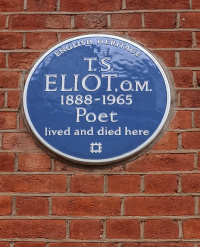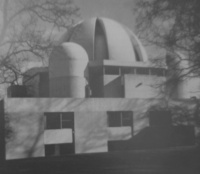

A global archive of independent reviews of everything happening from the beginning of the millennium
Read our Copyright Notice click here
For publication dates click here
Good modernism can be both soothing and make your heart leap but it was a revolution independent of politics: [1]
 An American, who gravitated to the epicentre of
English language at the dawn of modernism, helped bind together European
culture post-war
An American, who gravitated to the epicentre of
English language at the dawn of modernism, helped bind together European
culture post-war
 New Hall College dining hall, Powell & Moya,
1962-66, from Cambridge New Architecture
New Hall College dining hall, Powell & Moya,
1962-66, from Cambridge New Architecture
It arrived before the war and returned, with changed expression, to drive the post-war era forward until the mid-seventies. Pan-Europeanism was made much easier with it. Its globalised form, largely a post-1995 phenomenon, driven by materialist values rather that artistic and technical competence, has been spectacular but without those heart-leaping qualities.
HAROLD WILSON
Reviewed by ANDRE BEAUMONT
In my view Harold Wilson was the most successful Labour Prime Minister.
Labour folk try to minimize his achievements by crediting him mainly with holding his party together, reflecting their shrunken worldview, now always inwardly and ideologically filtered.
He did that fairly easily anyway in the 1964-1970 period because he was respected as being dynamic and politically adept in all parties. In his third term he began to be compared unfavourably with Heath who won a surprise victory in 1970 and was dynamic as well. (Heath would win the Sydney-Hobart race and Morning Cloud came through a lethal Fastnet race but it was his political win in 1970 that was a bit of a joy to watch on TV as pundits were confounded. After he was out of office I went to watch him conduct an orchestra - it was either the LPO or LSO - at the Barbican). Wilson's powers were beginning to decline by then.
Wilson kept Britain out of foreign entanglements - Rhodesia, Vietnam, and prolonged controversy about the Common Market. He initiated the withdrawal of British forces from east of Suez, retaining alliance links with Australia and New Zealand and, largely in name only, with Singapore and Malaysia.
His policy meant that under him Britain had a largely bloodless withdrawal from Empire (Aden aside), unlike with Attlee in India and Palestine.
Wilson had some intellectual giants in his party, even if we did not like them all, something Attlee certainly did not have.
The relatively young Wilson was a good foil to the youthful cultural explosion in the late sixites, and renewed modernism, something one cannot imagine of the more buttoned up Attlee.
Tony Blair's first term messed up the civil service big time, something it has never recovered from, and Gordon Brown did not understand business. Possible New Labour revanchism, like getting David Miliband to return to replace David Lammy should be held in suspicion.
It was the cultural factor that made Wilson's first term warmly remembered but in 1970 it was not that for which he was most associated but devaluation and his promise that the pound in your pocket will not, of course, be devalued.